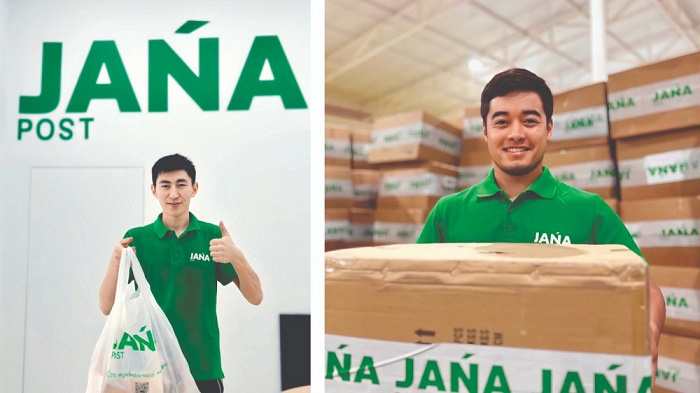E-Commerce is not a novelty in Central Asia anymore. It has been embraced by the mainstream society. However, the activity at e-commerce platform, though robust, is mostly on the local scale.
The expansion is constrained by two factor: 1. The limited geography of first-mile-collection and last-mile-delivery services; and 2. Lack of unified payment gateway solutions.
Some companies are gradually overcoming these barriers. One of the success stories is the Jana Post of Kazakhstan.
Jana Post is a Kazakh courier service specializing in the delivery of goods from international electronic platforms.
The secret of its popularity in Kazakhstan is the speed and simplicity of its services. Its intuitive and interactive portal makes it easy for the customers to order the goods and then track the progress in real time.
Since most of the products ordered by the customers are from China, Jana Post has partnered with Pinduoduo and 1688 Alibaba.
Pinduoduo, despite some negative publicity, is an easy-to-use retail e-commerce platform for ordering goods from China.
In e-commerce, Alibaba remains supreme if we take together two of its platforms – Taobao and Tmall. Even then, Pinduoduo is among the top five worldwide with its gross merchandize value (GMV) of USD 590 billion in 2023.
Temu is the US-based online marketplace owned by Pinduoduo.
1688 is the B2B side of Alibana. It was launched 1999 and provides sourcing and online transaction services by connecting manufacturers and wholesale sellers to wholesale buyers in China who typically trade in apparel, accessories, packaging materials, office supplies, home decoration and furnishing materials, electronics and computers, among others.
Partnership of Jana Post with Pinduoduo and 1688 has created the smooth access to these platforms for the consumers in Kazakhstan.
Part of the consumer confidence is the ability of Jana Post to offer the efficient and reliable postal and courier services.
With just over a year since its inception, Jana Post has already delivered more than 14 million orders.
A reason for its success is its geographical spread. Jana Post has 87 branches in Kazakhstan.
https://janapost.com/
http://jana-post.kz/
With quick and solid success in Kazakhstan, Jana Post has now started expanding to the other countries. It has established its presence in Uzbekistan and Kyrgyzstan.
According to a report by Kazinform, Jana Post explains that it decided to develop its business in Uzbekistan and Kyrgyzstan because of the similarities in legal conditions, consumer habits and logistics expertise between these countries.
Jana Post says that the choice was influenced by the fact that these countries are members of the EAEU Customs Union; they are subject to similar rules and laws regarding the logistics of e-commerce goods. Uzbekistan has similarities in legislation and, one might say, has moved further in the development of international trade. The markets themselves differ little – there is a similar penetration of the Internet and mobile phones, as well as the purchasing power of the population.
Right now, the company is opening dozens of representative offices and service points, while simultaneously training staff and solving other urgent problems in Uzbekistan and Kyrgyzstan.
The company has a lot of social goals, including reducing the cost of everyday purchases with a large selection, creating jobs, as well as educating the population in the field of doing business. The Jana Post courier service is ready to share its experience and scale its IT startup by developing innovative technologies. In particular, the company is actively working to implement modern solutions in the field of tracking, optimizing delivery routes, increasing the overall efficiency of the process, and is also constantly working to improve its mobile application in Google Play and the App Store.
Sourcing the products mainly from China and branching out to Uzbekistan and Kyrgyzstan is in line with the general trend at the national level. According to the State Technical University of China, in 2023, Kyrgyzstan increased trade turnover with China by 28.8% – to $19.8 billion, with $19.7 billion coming from imports of products. In turn, Uzbekistan increased trade turnover with China by 44.9% – up to $14 billion, including supplies from China for $12.4 billion. /// nCa, 26 Apil 2024
